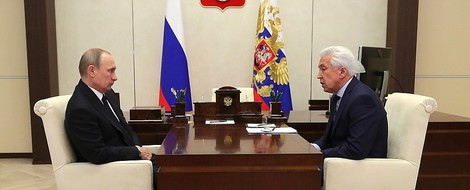Your podcast discovery platform
Curious minds select the most fascinating podcasts from around the world. Discover hand-piqd audio recommendations on your favorite topics.

piqer for: Globalization and politics Global finds
Neil Hauer is an independent analyst focused on Syria, Russia, and the Caucasus. Based in Tbilisi, Georgia, he served as senior intelligence analyst at The SecDev Group, an Ottawa-based geopolitical risk consultancy, for three years. He is presently engaged primarily on Russia’s role in the Syrian conflict.
How The Kremlin's Anti-Corruption Campaign Masks Federal Control In The North Caucasus
Badma Biurchiev, one of the world's top Dagestan experts, explains how the Kremlin's appointment of outsider Vladimir Vasilyev as head of Dagestan last fall marks Moscow's imposition of federal control over the region. Vasilyev was visited by Vladimir Putin in Dagestan on March 13, just days before the Russian presidential election, as a show of the Russian leader's faith in his project.
Vasilyev's own term kicked off in September with a spate of high-profile anti-corruption purges, including powerful and embedded figures such as Makhachkala mayor Musa Musayev and acting Dagestani prime minister Abdusamad Gamidov. But such measures are an established tradition for new leaders in Dagestan: Vasilyev's predecessor, Ramazan Abdulatipov, also started his term with well-publicized arrests of corrupt officials.
Dagestani officials operated largely independently from 1999 until the late 2000s, as clan politics became predominant in the republic. Over the course of the 2000s, this process repeated itself throughout the North Caucasus, before Putin, in his bid to recentralize power in Russia, appointed new heads of the regions near the end of the decade.
Vasilyev is the latest and most direct aspect of this phenomenon. He is the first non-Dagestani to head the republic in 73 years, and he has increasingly staffed his administration with others from outside the republic. But this tactic risks alienating nearly the entirety of Dagestan's population, who no longer have any sway over their own politics. With popular support absent and feedback mechanisms eliminated, Vasilyev's term could very well lead to a major catastrophe – the revival of the republic's weakened but not destroyed insurgency. With 11 Dagestani militants killed in a three-day span only weeks after this article was published, it appears Biurchiev's premonitions may have been very accurate.
